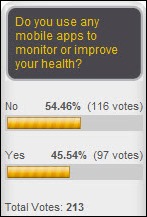Apple legacy? Seems I heard that before. Say around 1997. Jobs put out a 15 min video where a guy…
Monday Morning Update 11/25/13
From The PACS Designer: “Re: Android’s coming up fast. The latest information available on shipping volumes for mobile platforms shows the Android platform beating everyone else easily. While the healthcare space is benefiting from the huge volume of available Apple apps, it won’t be long before Android development expertise grabs the opportunity to offer solutions for big data applications which are sorely needed by researchers and practitioners.”

Our field involves technology and health, but only about half of respondents use apps to monitor or improve their own health. New poll to your right, inspired by Dr. Jayne: if you’re going to the HIMSS conference, will you be open to the possibility of finding a new job?
Healthcare IT news is always slow in November and December unless some company decides to do a year-ending acquisition, so don’t think a shorter HIStalk post means you’re missing anything. It’s not a magazine with an incentive to pad out the issue with non-newsworthy junk. As I always say, 90 percent of my job is deciding what “news” to ignore. I hate reading stories with attention-getting headlines and cleverly written prose that turn out to be a complete waste of time.
Sunquest forms The HIT Group, soliciting member companies that agree with its position that the FDA should regulate healthcare IT, with particular emphasis on patient safety and software development practices. I wouldn’t expect many companies to join except those who, like Sunquest, are already regulated by the FDA, but it would be a bold move for vendors to encourage regulation and use their influence to make it reasonable rather than waiting for the FDA to spring a potentially vendor-unfriendly surprise. As a patient, it’s hard to argue against external oversight of systems that are becoming more influential in how care is delivered. I’m not quite sure why the announcement letter capitalizes words and phrases that don’t require it, such as “patient,” “health information technology,” “government,” and “patient safety.”
The New York Times finds that Healthcare.gov was doomed from the start by an unbroken string of bad decisions: the White House’s infatuation with creating a dazzling site, its inflexibility on an October 1 go-live that required ill-advised shortcuts, White House meddling that caused weeks of delay in answering simple software engineering questions such as whether the user should be required to enter their Social Security number, CMS’s decision to use the NoSQL database despite warnings from contractor CGI that not many people know how to program against it, CMS deciding to act as its own systems integrator instead of hiring an experienced company, and putting a CMS official in charge without giving him the authority to make decisions without first contacting the White House. The gist of the article is that White House arrogance combined with CMS incompetence created a disaster that everybody saw coming but nobody could stop.
Encore Health Resources will present an HIStalk Webinar, “Looking Behind the Curtain: Value Based Care’s Impact on the Revenue Cycle” on Thursday, December 12 at 1:00 Eastern.
Health Canada apologizes to 40,000 medical marijuana users when it mails an information update with a privacy-torching return address of the Marijuana Medical Access Program.
Block Island Medical Center, a two-doctor practice in Rhode Island, reports frustration with its conversion to an unnamed EMR in its quest to collect HITECH incentives. The executive director says “it takes hours to enter records” and one of its doctors reports, “What used to take minutes to write in is now taking hours. The other night I was here until midnight.” A board member says the EMR is “totalitarian,” while the board president said they should have had an implementation person or guide.
The western Montana region of Providence Health & Services lays off employees to offset the cost of new positions required to support Epic.
Virginia-based gastroenterologist Michael P. Jones, MD (who, interestingly enough, also holds a degree in dentistry) writes a Los Angeles Times opinion piece on EMRs, saying it takes doctors more time to document procedures than to actually perform them and that the main role of EMRs is to create “a bill of sale” to get insurance companies to pay for services. He’s not a fan of the healthcare system in general, either:
My job is to listen and observe, to figure out who really does have something bad going on and who may simply be feeling the effects of life’s wear and tear. There’s a huge difference between that and the healthcare industry, which is more about industry than health or care. Third-party payors don’t really care what happens in an exam room. The visit that you, as a patient, have been anxiously waiting for could just as easily be shoes or oranges or pork bellies to these folks. It’s just a commodity. It’s just data. And now the industry wants it documented in a format that works for billers and statisticians but not so much for doctors: the electronic medical record.
Sponsor Updates
- Prominence Advisors is named as a “National Best and Brightest Companies to Work For” for 2013.
- Infor announces enhancements for its MediSuite system for hospitals in Canada, including workflow enhancements, the addition of care models, and improved physician integration.
Contacts
Mr. H, Inga, Dr. Jayne, Dr. Gregg, Lt. Dan, Dr. Travis, Lorre.
More news: HIStalk Practice, HIStalk Connect.






Sunquest and other established HIT companies will likely either support FDA regulation because it puts a difficult, expensive and irrational barrier solidly in place to thwart new entrepreneurs trying to break in to this space.
Don’t be manipulated by this obviously anticompetitive behavior.
So much good stuff you blogged on today!
Amen for Sunquest and Kudos to the Suzy RN. So many commenters here have said that for FDA regulation would help innovation. and others have said the opposite. I agree with Sunquest. I wonder if Sunquesters read your blog and comments.
Moreover, the NY Times investigation shows what went wrong when little went right at Obamacare website. Did Obama know, and if not, why not?
There are reasons to believe that considering the crashes and errors from hospital HIT systems, that similarities exist such as inexperienced leaders with zero HIT informatics training and old inefficient (for patient care) code were working tp construct hospital HIT EHRs.
And then you got that doctor guy writing in the LA Times who points out in a nutshell, why these systems running the care of patients are N.G. so that outcomes could never get better, safety is compromised, and users are forever hurriedly making mistakes on user unfriendly EHRs.
Thank you.
RE: Western Montana region of Providence Health & Services – Cutting other staff to pay for Epic Support
Does anyone have stats on what percentage of hospitals which implement Epic end up cutting patient care staff in order to support the higher than expected maintenance costs of the system?
@David – the article doesn’t even mention Epic, so shall we assume you’re just a curious completely disinterested party? I guess I’d like to see those stats, in addition to stats about unexpected costs for supporting Cerner, Allscripts, GE, athena, etc.
I must be missing something…
The feds blow Healthcare.gov big time, making every mistake a novice would. They create a monster called Certification that drives vendors nuts, still has many test data errors even after 11 months of Stage 2, and now we want that same government to regulate all EHR software???? Is there anyone left in this industry that is sane?
I agree with Newbie…big vendors see it as a nice new barrier to entry. But Sunquest should be careful what they wish for.
“And now the industry wants it documented in a format that works for billers and statisticians but not so much for doctors: the electronic medical record.”
I think the “format” was set in 1995 with the E & M coding rules.
I’m not eager to get back to the days of inaccessible manila file folders.
The combination of E & M coding rules and a computerized system that makes compliance easy to check (as opposed to the paper days when non-compliance was easy to obfuscate) is the thing that bothers most physicians. If we could use the EHR to document only what we needed to document, we’d be happier.
Hey Sunquest, you referring to the same federal gubberment responsible for the healthcare.gov website?
Bwaaahahaha!
Dorks.
“I agree with Newbie…big vendors see it as a nice new barrier to entry. But Sunquest should be careful what they wish for.”
HIS Junkie, Sunquest already deals with the FDA because of their Blood Bank system. It looks like they just want to share the experience with everyone else!
Why software companies (and specifically healthcare software vendors) continue to march toward little-known database systems continues to confound me. I am currently dealing with an organization that wants to move everything from Microsoft/Oracle to Intersystems Cache because “that’s what Epic uses”, despite the fact that there are very, very few qualified individuals in our areas of operation that actually know Cache.
Execs – listen to your technical team when they tell you you’re making a mistake by going with a technology that you can’t possibly support.
Cache is actually quite easy to work with and support. Runs like champ and scales like crazy.
You basically program it with a Pearl like language.
Re: DB_Lover
Healthcare data tends to not fit in RDBMSs very well. Think of how sluggishly Cerner (with its very normalized data model) performs even when running on top of the line hardware. As for finding people with Cache skills, send your people to training or get them a book–it’s incredibly easy to learn (if I did it, anyone can).
You may not know it, but the government is in the software business. They fund open source software development and then try to commercialize it to make some money back. Problem is that this model doesn’t work (ex VISTA and NoSQL)! This is why open source and lesser known software /databases are used. They ONLY have to pay for the configuration, maintenance and training…The cheap stuff.
Most of what the Federal Government does ends up being a train wreck. VA, US Postal Service, Healthcare.gov, US Energy Policy, US Dept of Education
…and a 1000 others.